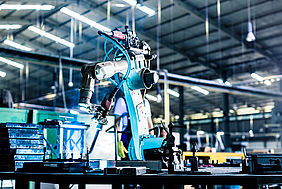The EIT Digital project OEDIPUS (Operate European Digital Industry with Products and Services) was set up in 2017 as a 3-year High Impact Initiative aiming to accelerate the digital transformation via five European iCenters and to create digital solutions and services for the manufacturing industry. The former would serve as first lighthouse showcases to attract SMEs that seek to develop their tasks in a risk-free and supported innovation environment.
From 2018 on, the iCenters were fully operational, attracting several hundred visitors per year from more than 300 SMEs and industry stakeholders. and hosting more than 250 yearly events. Three SMEs per iCenter in 2018 and ten in 2019 have been involved in deeper experimentations. An example of typical deeper SME interaction is the one made possible by the DIDA (Digital Industry Data Analytics) Platform developed by Engineering in the Turin iCenter.
The DIDA (Digital Industry Data Analytics) Platform helps users to monitor and identify shop-floor incoming events (i.e. machine breakdowns or quality issues), while visualizing and supporting decision making (i.e. updating the maintenance plan).The Platform offers capabilities to manage data from different sources by aggregating them and providing analytics and visualization services targeted to different purposes.
Several applications can be developed on top of the Platform, such as production system monitoring, as well as product quality assessment, control and management. The solution exploits existing Open Source software components such as those available in the FIWARE ecosystem as well as those designed and managed directly by Engineering, namely the Knowage Suite, which are able to provide Business Intelligence, Big Data analytics and visualization features.
The DIDA Platform has been experimented in different contexts, both research laboratories (in collaboration with Politecnico di Milano), and industrial plants, in collaboration with Fiat Chrysler Automobiles (FCA)/Centro Ricerche Fiat (CRF). For what concerns the FCA/CRF case study, the experimentation is based on data coming from various sensors from the shopfloor (e.g. from sensorized welding cells) that are stored and elaborated.
Thanks to Knowage Suite’s intuitive and dynamic interface, DIDA allows non IT users, such as analysts and managers, to easily create analytics dashboards starting from these data, enabling and improving the decision-making process for the prevention of faults generation and propagation.
“We already had a monitoring system in place enabling us to quickly spot obvious issues, but we wanted to go one step further into data analysis through advanced visualisation techniques and identify incoming events. The next step will be to integrate other predictive analytics strategies, and that is what we are working on right now,” CRF’s Julien Mascolo said. The major benefits derived from applying the solution are measured by three main indicators:

